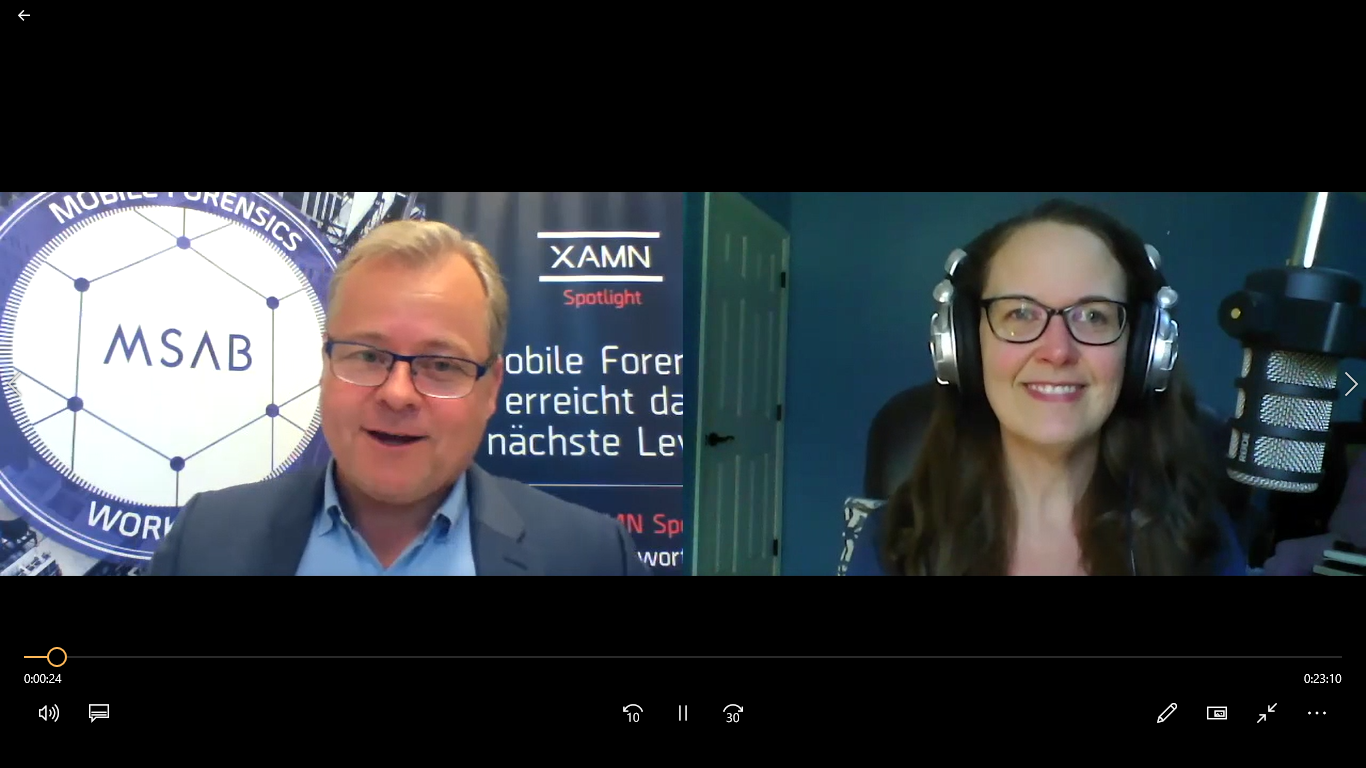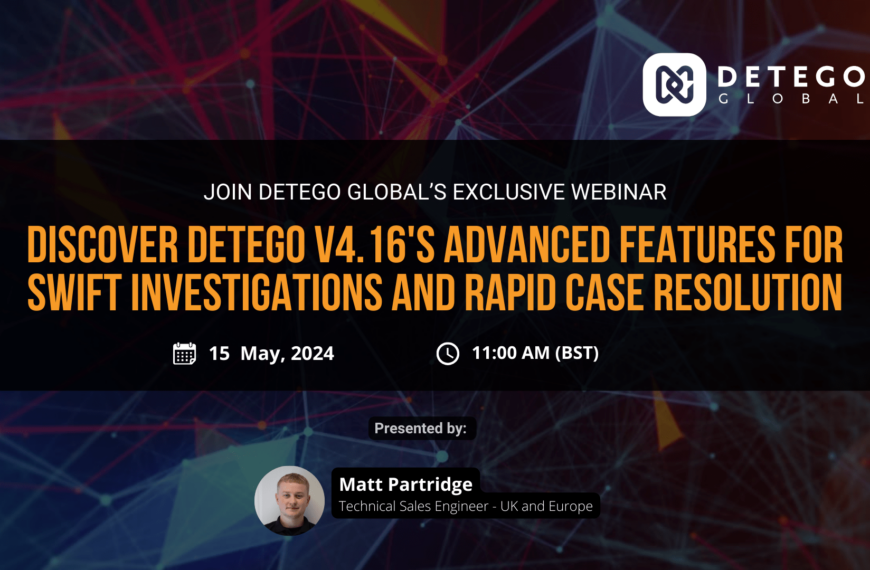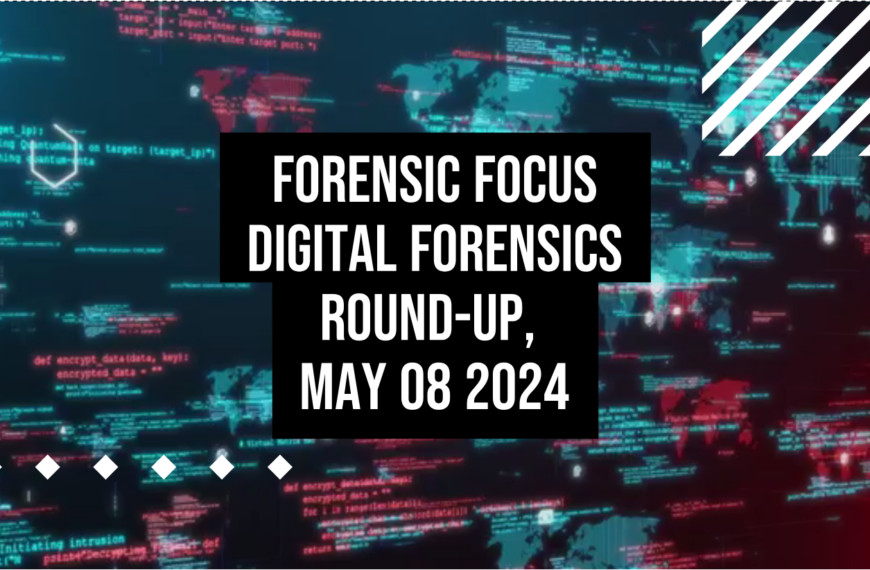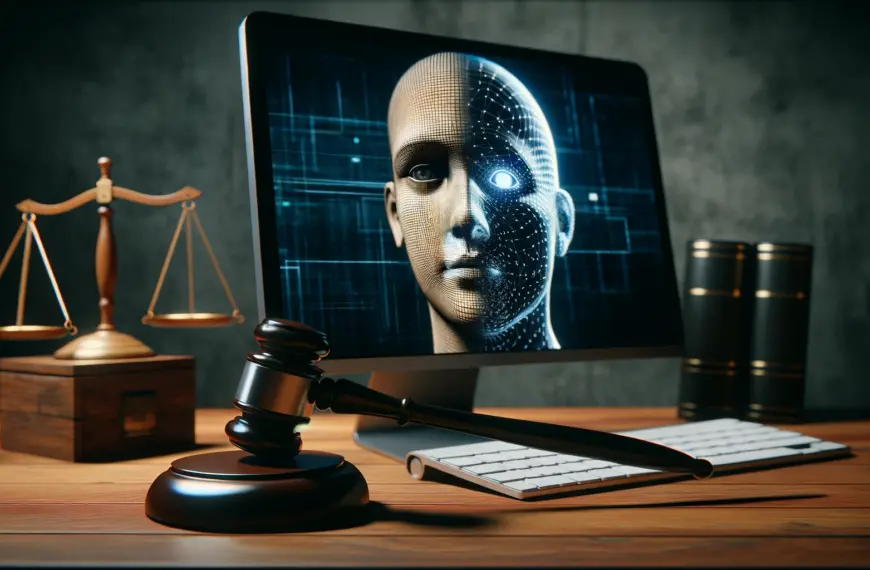Christa: An industry that changes as rapidly as digital forensics does demands a careful balance between informed business experience and the technical knowledge needed to pivot when businesses encounter disruptions. With us this week on the Forensic Focus Podcast is Joel Bollö, who has worked for nearly two decades as Chief Executive Officer of MSAB. I’m your host Christa Miller, and welcome, Joel.
Joel: Thank you. Thank you so much. Glad to be here.
Christa: It’s good to have you. So to start with, you’ve been with MSAB, helming the company for 20 years as of next year, since really the very beginning of not just the company, but mobile forensics as a discipline. What are the key highlights for you from these last few decades?
Joel: Oh, wow. There has been a lot. I mean, it started with a highlight, actually. As MSAB we’ve been working with cell phones before we do what we do today. And we were contacted by the Swedish police who had a demand to actually copy SMS and contacts so they could do translation. That was the man. So the first highlight was actually when we were contacted by them and realized how we could help them, how we could improve their performance. That’s actually where we started. And then there’s been several highlights. I mean, this is a fast-moving industry, and as you said, I’ve been here for close to 20 years now. And we were first out to this industry and a couple of highlights have been for me personally, but also for the company is when we set up our North American office. I moved over family, spent two years in the US and it’s been a success since then, so I’m proud of that. But from the beginning, we started to realize that more and more even now, we we’re thinking about the integrity. So afterwards I realized how forward-thinking we were when we started to create the secure file format that we actually still have. Of course that’s been developed over time, but we had that secure file format and integrity thinking from day one. And when I looked in the mirror, I was like, “We were really pioneering that part.” Yeah. So that one. Yeah.
Christa: So how have you seen the market for mobile forensics change in that time? I mean, two decades, what’s the same, what’s different both broadly and maybe across different regions of the world?
Joel: Oh, wow. Yeah, there’s a lot. There’s a lot that’s been changed, but at the same time, there’s a lot that is still the same. I mean, this is probably one of the fastest developing markets I could think of. I mean, when we started to do our first mobile forensic tools, there were no cameras even on the phones. And when cameras came, that was sort of a new thing, but we can’t compare the cameras that were in the first ones with what we have today. In that sense it’s been developed a lot in terms of technology. That is good. I mean, this was when we started with this, it was more or less a niche market for the forensic labs. They were doing this and they were happy to do this kind of work just based on what you could get out of it.
What has now developed is that, I mean, it’s impacting law enforcement globally, this challenge, I would say with these devices. So it has gone from being sort of a niche market now more into something that impacts the whole law enforcement. I mean, not only for the forensic lab, it’s how do I deal with these devices from, you know, when I confiscate these devices until all the way up to court and maintain the chain of custody and all that? So it’s been a lot of change in that sense, and also legislation has been changed over time and what you’re able and not been allowed to do with these devices and what requirements under what circumstances, I would say does law enforcement legally have the right to investigate the phone or whatever. And that’s developing as we speak as now. What’s still the same is that, I mean, these devices, you know, every person’s, you know, maybe most commonly used device today, more than computers, more than anything. So it’s also the number one tool for bad guys. And it was a number one tool also for bad guys when we started. So that’s the same.
And it’s this challenge about, you know, getting the data, securing the data. I mean, let’s say we call it “revealing the evidence” I mean, what’s in this device? So that’s pretty much the same, and my experience, and this is pretty funny because, I mean, we have offices in, I think, 16 countries now and the most common thing I hear from my staff, especially when we set up a new country is that, “Yeah, you know, maybe the industry in other countries works like this, but in our country it’s very special because we need this and this.” And when someone says that, I know, okay, now it’s exactly the same as the rest of the world. Because it’s revealing the data, securing the evidence and doing it in a correct manner. So it’s been developed many times, and we can say that for the reason that these devices have also become so important for us, you know, doing voting, bank services, and, you know, it’s much more than just a cell phone. Also the encryption and that part has increased a lot into these devices. So the barrier to entry is now much, much higher than ever, I would say, into this industry.
Christa: Oh, Okay. Yeah. So, actually, you mentioned having offices in 16 different countries. I wondered whether the needs for law enforcement in those different countries are generally about the same? It sounds like it is. Are there any significant differences that you’ve noticed?
Joel: Well, are there any significant differences? I mean, no, I would say no. I mean, first of all, we act in democracy. So we work with good countries. So in those countries, I would say it’s mostly the same. There are some variations of what they can do, but no more variations that there are like between different states in the US, for instance, so in that sense. But what we see is that when we started with this industry they were able to cope with all the phones that they confiscated because there weren’t that many phones. In general we can see now that I can’t think of any customer we’re speaking to or have heard of in our key markets that has not more phones than they are capable of doing, actually. So, what our customers in general are discussing now globally is, “Well, how do we adopt this challenge?” We realize that this thing will not go away. We just continue to increase both the number of phones, but also the amount of data per phone.
Christa: So, I guess kind of, on that note, you know, again, we’ve talked about this rapidly moving industry, possibly one of the fastest in the global economy. Talk to us a little bit more about some of those technology challenges, you mentioned encryption and some of the other issues that law enforcement’s running into. What do you see on the horizon at this point for challenges and how are you adapting to meet those challenges?
Joel: Yeah, I mean, as I said, what we see is that the encryption, that part becomes more and more advanced because, I mean, we want these to be safe for us that don’t have a purpose to commit crime or do bad things for society. So I think it’s important to have a balance between integrity, but also security. And when I talk about security, I mean, we have the police force to keep society safe. And I think the challenge, and I don’t have the exact answer on this that us and our industry, but also legislation makers need to think of is, how do we balance so we don’t get the mass surveillance society? Where they think, “Well, now they’re so secure, so we’re going to force the industry to have a back door for everyone.” I don’t think anyone, I don’t want to have that either.
So that is something that society in general needs to adopt that challenge because we see that it’s coming up. But that said, we also see that there’s ways of, you know, combining information so you can reveal evidence for these devices. But I think if I look further on down the line, I think that’s a big challenge, but also the big data thing. I mean, even if you can unlock and extract this information, there’s no way of being able to walk through a device or several devices manually today. It’s simply too much data. So I think, also the industry is going to be more and more AI-driven. You know, you need to have computers helping you, giving you, I would say they can’t do precise work, but they can suggest maybe this is what you’re looking for, this is what you do to figure that out, to keep the efficiency, because it’s simply too much data
Christa: Kind of on that note, you touched on legislation a little bit ago. I wanted to talk about the impact of new privacy legislation in the European Union, now also in the United Kingdom, as well as in some US states. How is that kind of legislation affecting customers and in turn, product development?
Joel: I mean, I think it’s all right. I think it’s good that these legislations come up because it’s about integrity and privacy. So you can’t do anything just for a small crime because these are very powerful tools, as well. So I think what it does is, it sharpens up our customers’ way of working. They need to find standards of different ways of working. We see now the demand for different types of standards in life, so there is an initiative called CASE and there’s other initiatives, like FORMOBILE in Europe. So there are different initiatives dealing with it. So it needs to be set to standard. So from crime scene to court, there needs to be a certain way of doing this. And I think it’s good because it will be positive. You will keep, maybe even increase the trust for the police and for the law enforcement. So when it’s necessary, we can give them or leverage what they need to do to do the right thing, because if things are misused, on purpose I would say, or maybe there’s misinterpretation, that can hurt the whole industry. So I think it’s good that there is an open discussion around this. And I’m proud that MSAB is at the forefront in many ways, initiatives of this standardization.
Christa: Yeah, I wanted to ask about that. You mentioned the FORMOBILE project in the EU and I know your company occupies a very unique position in that. You’re, I think, the sole vendor that’s involved in that. So I wanted to find out more about that partnership and how you anticipate FORMOBILE will shape mobile forensics in terms of that evidentiary quality and integrity and confidence in coming years.
Joel: Yeah. I mean, if you look back, why did this initiative even come up from the European Union? Well, I wouldn’t call it wild west, but there were so many different tools and ways of doing this kind of work. So as this type of evidence became a common evidence in courts, they realized when defense or even juries or prosecutors asked about this, there were so many different variants that they didn’t really understand how this evidence was created, or was it done in a forensically safe way? So the purpose with the FORMOBILE initiative was to set the standard for, not what to, but the standard of, how to secure, I mean, this whole chain of custody. And I think it’s been good. We are the only industry part in this and there are 19 other parts in this FORMOBILE project.
And it’s universities, it’s police academies, police forces and different stakeholders. And the outcome of this will be a suggestion of a standard on how to do this, but it’s not only about tools and what the tools should do. It’s also about how to deal with this, how to train, how to retrain or keep people updated. And as crimes are more and more moved to the cyber, the police need to follow that. This is a way of educating the police to follow and to track evidence where evidence is to be found. And that is in cyber. And these are the cell phones that are the key device to be used in cyber. So I think the outcome is that, we confirmed this product already, and I think the outcome will be that other parts of the world are looking to, what have the European Union or this FORMOBILE product lead to? And we already hear now from European customers, but also elsewhere that they’re looking into this and it’s not mandated to follow this, but it is becoming more and more recommended to follow this. We’re proud to be not just part of it, we’re proud that we have been able to lead several workshops in this project over the last two years that it’s been going on right now.
Christa: I’m hoping to talk with some representatives from FORMOBILE a little bit later this year, so I’m looking forward to hearing more about that, for sure. So we’ve talked a fair amount, or you’ve talked a fair amount about evidentiary integrity and increasing confidence. And that was another topic of discussion that we had in April with Henrik Tjernberg, who was then MSAB’s chairman of the board. So I’m going to switch gears a little bit. Since we had that conversation, Henrik sold his shares to new owners. I wanted to find out more about the new owners, what expectations they have on MSAB and what possibilities or opportunities you see with them now on board.
Joel: Oh, that’s a big question and it’s a great question. First of all, I would like to say, Henrik’s been with with the company for 25 years, or 26 years, 35 years, sorry. He started 1985. Long before we started what we do now. Henrik’s been a big part of the success of MSAB. So, rightfully so, he is retired now. I mean, he’s done great work for MSAB. But also I’m happy that Henrik and I were able to find new good owners. One of the largest owners of the MSAB company now is actually one of the founders of AXIS. AXIS is a global leader in surveillance cameras. Swedish company that started small and grew to a really big player globally in surveillance. I think we have a lot to learn from them. They are ahead of us in terms of revenue and staff-wise, but they have exactly the same experience, being sort of a product company exporting globally, set up and working in the same type of environment as we do. So that’s good.
Our second-largest owner is also one of the founders of Spotify. So he is invested heavily in MSAB. So I have other financially-strong owners as well. And expectations from them, I think they’ve seen a lot of similarities in businesses that they’ve been in before or are still in, but realize, and see the potential of MSAB. They don’t think, and I agree with them, that we have capitalized on actually what we are providing. We have very strong technology, we have very strong customers, we have long-term relationships with many customers, but we haven’t capitalized on it as we could. We think we deserve more, actually. And they see that this industry, whether we think it’s been developed and we’ve been in a long time, it’s just in the beginning, this will be a much, much, much, many times larger industry in the coming 10 years than it is now.
So I think expectations from their side is growth. They have high expectations of me as a CEO. And I like that. I think it re-energized myself, it re-energized the company. So we will see a lot of good things coming out and happening accelerated from MSAB in the coming years here. And they have good experience and financially strong, as I said. So yeah, I think it will just boost MSAB. I mean, there are a lot of things happening in the industry in general, but this is good timing for us. So I’m proud and happy to have these new owners on board.
Christa: And I think, you know, kind of getting started with those kinds of market opportunities, you announced a partnership with Detego in May, broadening first responders’ reach to digital media of all kinds, which really, I think, demonstrates some of what you’re talking about in terms of technology that computers are not going away just like mobile devices are not going away. They continue to be as important in criminal investigation. So tell us more, if you could, about how your customers are benefiting from this partnership.
Joel: Yeah, absolutely. First of all, I would maybe start with genre. I think the industry is genred. I mean, when we started many years ago with this, there was a very clear distinction between computer forensic, mobile forensics or, you know, whatever it was. Today these industries, they sort of overlap and blur into each other. I mean, we still call our cell phones a cell phone, but is it really a cell phone? I mean, we do so much more with these devices. So it’s natural that customers also demand that they want to compare information and it overlaps so much. So they can’t have different tools doing different things when they basically overlap already. So a partnership like we have with Detego is a great example. Detego is a very strong company within computer forensics. So it’s a good way to be able to mix information and compare information.
I mean, many oftentimes you run into a computer and a cell phone device, and you want to compare and share that data: what’s common, what’s not common, are they connected to each other? I mean, there’s a lot of things to that. So, that said, I think what we see in the industry is that the customers compared to before don’t want to buy, or can’t buy five, six, or maybe even 10 tools, because they have an edge on different things. They want to buy more from fewer vendors because they can’t cope. So I think in the industry you see that happening now. Also in an M&A phase. And I think that’s driven both by the company’s growth and these things blur into each other, but also that the customer starts to say, “Well, you maybe have an answer on certain things, but we can’t buy 20 tools because they have an edge on certain things. We need to buy something that has a more broad perspective and may be good enough even on certain things, but we can focus on this boundary.”
And we see that, especially what we call, ‘informed plan’. When we sell stuff to do forensic labs, they can have multiple tools. And I think that they should have, and they will continue to have that. But when we work with what we call, ‘frontline solutions’ like our kiosks or tablets, or, you know, decentralized extractions, they don’t choose different or multiple tools. Same thing with analytical tools, they want to have fewer analytical tools than they have in their forensic labs. So I think this will just benefit. It benefits us, Detego, and of course the industry in general, our customers in general, I should say.
Christa: So we’ve talked a lot about the changes that have happened over the last 20 years. So based on what we’ve already seen, what do you predict the forensic market will develop over the next upcoming 20 years?
Joel: Wow, that’s a good question. First of all, I mean, as I said, I’ve been here for 20 years and I was trying to think, how old am I going to be in 20 years? Maybe, I should say, maybe/hopefully I will be here in another 20 years, that’s the borderline. But anyhow, I love what I do, and I think this industry, as I said, even though we think has developed a lot during the past 20 years, it was pretty slow the first 10 years or 12 years, I would say, but it’s vastly being changed in the last five, six years. And basically because it’s been accounting for our customers. This is something that, I haven’t thought about anything that challenged law enforcement as much as these devices. and it’s going to continue doing that. So I think these devices are still going to be number one.
I think it’s going to be a whole different way for law enforcement globally on working with data evidence. Now there are special people working with it, they train frontline users and everything. So I think it’s just gonna continue to grow. And this is maybe going to be, the mobile phones in general are going to be probably the largest tech industry globally in 20 years. And our industry, which will help us create a safer society will also be increasing a lot, and we need to cope with this. And if I should say something, I think this is going to be so critical that even governments will say, “We need to have this industry, you know, locally. We need to depend on local partners.” Like. Europeans might say, “We want MSAB” or the US needs software. I think it’s going to be like, this is going to be a society-critical industry. We’re going to have a much more major role in society than we have today, in general.
Christa: So more like critical infrastructure or something like that is what it sounds like.
Joel: Yes, and look at this chip industry now. I mean, the world is so dependent on who can provide us with the smallest of chips. But both the US and Europe are now starting to build their own industry, I realize that. Some kind of industry, you need to have it locally, you can’t be dependent on others. It’s going to be critical for society. And I think in 20 years, this industry will be part of that, as well.
Christa: Very interesting. Yeah. It’ll be interesting to see where it goes, for sure.
Joel: Yeah. We just see opportunities in terms of, so much we can do with this.
Christa: Yeah. Well, Joel, thank you again for joining us on the Forensic Focus Podcast. It’s been a pleasure.
Joel: Oh, my pleasure. Thank you. Okay.
Christa: Thanks also to our listeners. You’ll be able to find this recording and transcription along with more articles, information and forums at www.forensicfocus.com. Stay safe and well.

























